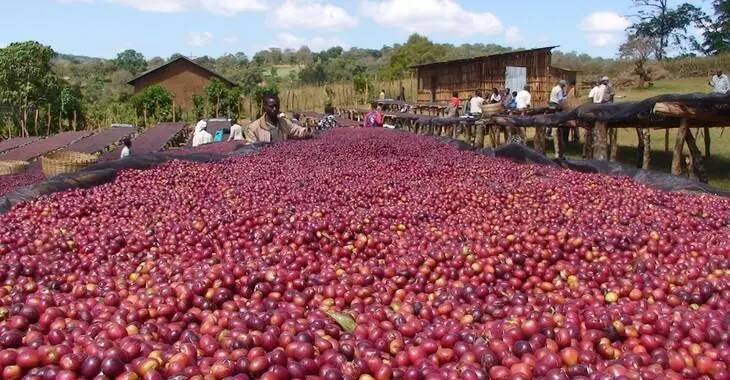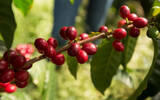African Coffee Association officials urge traders to export coffee under special treatment and to reduce the export of coffee under traditional treatment.
The 20th African quality Coffee Conference and Exhibition was held from February 6 to 10 in Addis Ababa, Ethiopia, to promote the export of specially treated coffee from Africa, Xinhua reported. The event brought together more than 800 regional and international coffee roasters, traders, producers and buyers to discuss policy, sustainability and international coffee markets. While coffee from Africa is becoming increasingly popular among consumers around the world, officials from the African Coffee Association (AFCA) urged African coffee traders to promote the export of specially treated coffee and to reduce the export of traditionally treated coffee to international markets. According to Ethiopia's current coffee bean export policy, special treatment coffee beans are required to double the export price of traditional coffee beans.

Amir Hamza, chairman of AFCA, said in an interview with Xinhua that the biggest problem facing Africa is poor marketing methods and the export of ordinary coffee, which is a problem that AFCA is trying to solve. Africa has the best coffee but no decent sales, making it impossible for most coffee growers to get the right price. African coffee exporters need to focus on special treatments for coffee and apply better marketing strategies to increase their coffee export revenues.
African coffee export companies are also encouraged to strengthen trade promotion and expand markets while focusing on improving quality and processing to meet the needs of import markets and to build brands for sustainable exports. After raw coffee beans are exported from Africa, they will be mixed and baked by companies outside the African continent, particularly from Europe and the United States, and then sold as coffee products from other sources in the Middle East and the far East. The African coffee industry is also urged to shift its focus to improving product quality and adapting to market taste trends, particularly in the major coffee consumer markets, which account for half of global coffee imports, including the United States and the European Union.

According to the executive director of AFCA, coffee growers in Africa lack the necessary knowledge and technology to produce high-quality coffee. African traders are therefore urged to cooperate and establish production chains to adopt modern technologies and to promote the transition from raw coffee to processed coffee exports. Coffee production and exports in Africa were affected by rising inflation geopolitical and fertilizer costs and coffee exporting companies should closely monitor the market to develop appropriate business strategies. Finally, coffee buyers and governments are called on to support farmers' knowledge and skills in coffee agronomic practice, as well as to help them obtain appropriate product prices in the international market.
According to AFCA, non-coffee producing African countries, such as Egypt, Sudan, Libya, Algeria, Morocco, Nigeria and South Africa, will be the most important destinations for the African coffee market. And with regard to the upcoming EU deforestation regulations, Africa imports more coffee than exports, and the chairman believes that the regulation will have less impact on African coffee exports. In the future, African producing countries face the challenges of climate change, access to investment, low production and market access.
Important Notice :
前街咖啡 FrontStreet Coffee has moved to new addredd:
FrontStreet Coffee Address: 315,Donghua East Road,GuangZhou
Tel:020 38364473
- Prev

What is the purpose of spraying steam before milking? Lattes need to pay attention to important details before drawing flowers!
Every time we pass by the cafe, we can not only smell the strong smell of coffee, but also hear the "squeak" milk beat from time to time. Looking at the hot barista inside, I wonder if you have observed such an action: before and after using the steam bar, the barista will let him breathe for a few seconds.
- Next

Guatemala Coffee beans, Antigua producing area Raminita Coffee beans
In the coffee growing belt, and the American region happens to be in the coffee growing belt, there are many famous coffee growing countries in North America, such as Panama, Honduras, Costa Rica, Guatemala and so on. Guatemala, as the ninth largest coffee producer in the world, is famous for its high-quality alpine hard beans. Dangerous
Related
- What grade does Jamaica Blue Mountain No. 1 coffee belong to and how to drink it better? What is the highest grade of Blue Mountain coffee for coffee aristocrats?
- What are the flavor characteristics of the world-famous coffee Blue Mountain No. 1 Golden Mantelin? What are the characteristics of deep-roasted bitter coffee?
- Can I make coffee a second time in an Italian hand-brewed mocha pot? Why can't coffee be brewed several times like tea leaves?
- Hand-brewed coffee flows with a knife and a tornado. How to brew it? What is the proportion of grinding water and water temperature divided into?
- What is the difference between Indonesian Sumatra Mantinin coffee and gold Mantinin? How to distinguish between real and fake golden Mantelin coffee?
- What does bypass mean in coffee? Why can hand-brewed coffee and water make it better?
- Unexpected! Ruixing Telunsu lattes use a smoothie machine to foam milk?!
- % Arabia's first store in Henan opens into the village?! Netizen: Thought it was P's
- Does an authentic standard mocha coffee recipe use chocolate sauce or powder? Mocha Latte/Dirty Coffee/Salty Mocha Coffee Recipe Share!
- What is the difference between Vietnam egg coffee and Norway egg coffee? Hand-brewed single product coffee filter paper filter cloth filter flat solution!

